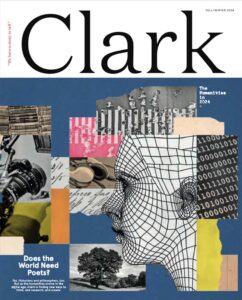
Professor OUSMANE POWER-GREENE doesn’t believe that the teaching and learning of college-level history should be contained only to a select few who can afford the privilege. This conviction leads him into neighborhoods in Springfield and Holyoke, where he engages students who are eager to access his expertise, but who, without a vital initiative supporting them, might otherwise be unable to do so.
Power-Greene is an instructor in The Clemente Course in the Humanities, a nationwide program providing free accredited college humanities courses to adults facing economic hardship and other adverse circumstances that impede them from pursuing higher education opportunities. The goal is to empower the participants not only to expand their knowledge and boost their careers, but also to “engage actively in the cultural and civic lives of their communities.”
Power-Greene, who has been teaching Clemente courses since 2014, said the thirst for humanities education is intense and egalitarian—participants can range in age from the late teens to 70s (or older) and represent a wealth of ethnic, cultural, and national identities. Some have long been living in the U.S.; others are pursuing citizenship. But when they walk into a Clemente classroom, they are united in one important way: They want to be there. Heartily.
“These people are incredibly eager to engage, and there’s joy in that,” Power-Greene says. “Everyone brings with them an inner thirst for knowledge and their own understanding of the world, which really drives deep conversation, debate, and questions. Sometimes they’ll tell me, ‘We didn’t talk about this stuff in our high school history class.’ ” To date, 10,000 people have taken part in Clemente seminars.
Launched in New York City in 1996, The Clemente Course was established in Holyoke in 1999 by David Tebaldi ’69, then executive director, CEO, and president of the Massachusetts Foundation for the Humanities, and was expanded into other low-income communities in urban centers across the state, including Worcester. Tebaldi, who majored in philosophy at Clark, recruited humanities scholars from colleges around the commonwealth, with Power-Greene and fellow history professor Amy Richter among Clark’s most enthusiastic practitioners. Last year, Richter earned Clark’s John W. Lund Community Achievement Award for her Clemente work in Worcester, including as the local program’s academic director.
“The animating belief of The Clemente Course is that the study of the humanities provides us with knowledge and skills that enable us to take fuller control of our lives, to think and act deliberatively, and to be more active and informed citizens,” Tebaldi says. “Here was an opportunity to demonstrate that the humanities are not just for college-educated elites. They are for everyone.
“HUMANITIES ARE NOT JUST FOR COLLEGE-EDUCATED ELITES. THEY ARE FOR EVERYONE.”
“Working with a diverse community of avid adult learners who bring an astonishing array of often heart-wrenching life experiences to the interpretation of texts, the relevancy of history, and the nuances of moral reasoning, presents new ways of approaching the essential questions that are the unique purview of the humanities.”
Power-Greene notes that the simple act of handing a person a book and saying, “You’ve got to read this,” or urging someone to visit an art gallery, can filter into a community in a powerful way. It is how the recipients of that guidance interpret the materials and immerse themselves in essential dialogues about history, literature, art, and ethics that have become the hallmarks of Clemente courses.
“Always, we’re trying to get at not just what we do, but why we do it,” Power-Greene says. “People have questions and opinions about the ‘why,’ which they’re eager to express. That’s a great thing.” ▣

